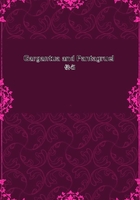
第270章
How Pantagruel received a letter from his father Gargantua, and of the strange way to have speedy news from far distant places.
While Pantagruel was taken up with the purchase of those foreign animals, the noise of ten guns and culverins, together with a loud and joyful cheer of all the fleet, was heard from the mole. Pantagruel looked towards the haven, and perceived that this was occasioned by the arrival of one of his father Gargantua's celoces, or advice-boats, named the Chelidonia; because on the stern of it was carved in Corinthian brass a sea-swallow, which is a fish as large as a dare-fish of Loire, all flesh, without scale, with cartilaginous wings (like a bat's) very long and broad, by the means of which I have seen them fly about three fathom above water, about a bow-shot. At Marseilles 'tis called lendole. And indeed that ship was as light as a swallow, so that it rather seemed to fly on the sea than to sail. Malicorne, Gargantua's esquire carver, was come in her, being sent expressly by his master to have an account of his son's health and circumstances, and to bring him credentials. When Malicorne had saluted Pantagruel, before the prince opened the letters, the first thing he said to him was, Have you here the Gozal, the heavenly messenger? Yes, sir, said he; here it is swaddled up in this basket. It was a grey pigeon, taken out of Gargantua's dove-house, whose young ones were just hatched when the advice-boat was going off.
If any ill fortune had befallen Pantagruel, he would have fastened some black ribbon to his feet; but because all things had succeeded happily hitherto, having caused it to be undressed, he tied to its feet a white ribbon, and without any further delay let it loose. The pigeon presently flew away, cutting the air with an incredible speed, as you know that there is no flight like a pigeon's, especially when it hath eggs or young ones, through the extreme care which nature hath fixed in it to relieve and be with its young; insomuch that in less than two hours it compassed in the air the long tract which the advice-boat, with all her diligence, with oars and sails, and a fair wind, could not go through in less than three days and three nights; and was seen as it went into the dove-house in its nest.
Whereupon Gargantua, hearing that it had the white ribbon on, was joyful and secure of his son's welfare. This was the custom of the noble Gargantua and Pantagruel when they would have speedy news of something of great concern; as the event of some battle, either by sea or land; the surrendering or holding out of some strong place; the determination of some difference of moment; the safe or unhappy delivery of some queen or great lady; the death or recovery of their sick friends or allies, and so forth.
They used to take the gozal, and had it carried from one to another by the post, to the places whence they desired to have news. The gozal, bearing either a black or white ribbon, according to the occurrences and accidents, used to remove their doubts at its return, making in the space of one hour more way through the air than thirty postboys could have done in one natural day. May not this be said to redeem and gain time with a vengeance, think you? For the like service, therefore, you may believe as a most true thing that in the dove-houses of their farms there were to be found all the year long store of pigeons hatching eggs or rearing their young. Which may be easily done in aviaries and voleries by the help of saltpetre and the sacred herb vervain.
The gozal being let fly, Pantagruel perused his father Gargantua's letter, the contents of which were as followeth:
My dearest Son,--The affection that naturally a father bears a beloved son is so much increased in me by reflecting on the particular gifts which by the divine goodness have been heaped on thee, that since thy departure it hath often banished all other thoughts out of my mind, leaving my heart wholly possessed with fear lest some misfortune has attended thy voyage;for thou knowest that fear was ever the attendant of true and sincere love.
Now because, as Hesiod saith, A good beginning of anything is the half of it; or, Well begun's half done, according to the old saying; to free my mind from this anxiety I have expressly despatched Malicorne, that he may give me a true account of thy health at the beginning of thy voyage. For if it be good, and such as I wish it, I shall easily foresee the rest.
I have met with some diverting books, which the bearer will deliver thee;thou mayest read them when thou wantest to unbend and ease thy mind from thy better studies. He will also give thee at large the news at court.
The peace of the Lord be with thee. Remember me to Panurge, Friar John, Epistemon, Xenomanes, Gymnast, and thy other principal domestics. Dated at our paternal seat, this 13th day of June.
Thy father and friend, Gargantua.